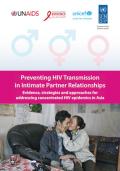Publications - Released in 2015
Preventing HIV Transmission in Intimate Partner Relationships: Evidence, strategies and approaches for addressing concentrated HIV epidemics in Asia provides evidence-based guidance to policymakers in Asia so that national HIV responses give appropriate priority to prevention efforts among key populations and their intimate partners, as well as those in serodiscordant relationships. Scaling up efforts to prevent intimate partner transmission of HIV will help countries to meet targets to halve sexual transmission of HIV, eliminate mother-to-child transmission, reduce AIDS-related maternal deaths, and address gender inequalities.
This report by UNDP, UNICEF and UNAIDS responds to data which shows that new infections in the long-running HIV epidemics in Asia, such as in Cambodia, China, India, Indonesia, Myanmar and Thailand, are on the increase among intimate partners of high risk populations. Reviewing the interplay of factors that affect sexual behaviours and decision making among key populations and people living with HIV, the report recommends strategies that need to be adopted by countries for a more comprehensive response to intimate partner transmission.
The report argues that efforts to address intimate partner transmission of HIV should concentrate on the interplay of factors that affect sexual behaviour and decision-making among key populations and people living with HIV who know their status, including how they negotiate safer sex and make contraceptive choices with their intimate partners.
Downloads
Organizations
- United Nations Development Programme (UNDP)
- United Nations Children’s Fund (UNICEF)
- Joint United Nations Programme on HIV/AIDS (UNAIDS)






